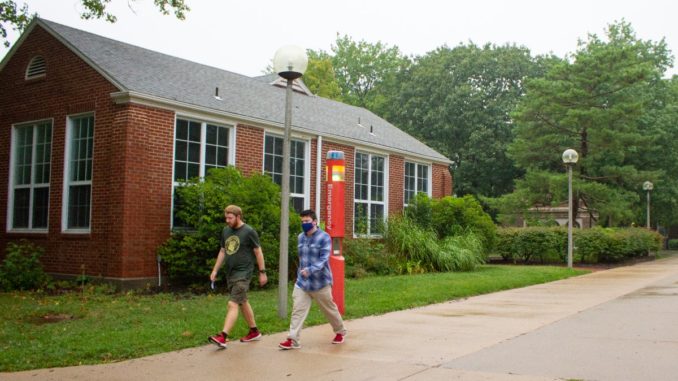
Truman State University has established a plan for isolating positive COVID-19 cases on campus and developed a new page on its website to track the number of cases among faculty, staff and students.
“If we have a student who tests positive and needs to be placed in isolation — a student who lives on campus — we have identified spaces that are currently vacant at Campbell Apartments,” Janna Stoskopf, vice president for student affairs, said.
The apartments will allow students to have access to all residential needs, including private access to their living space and a private bathroom while in isolation. Rooms in Centennial Hall that are currently vacant are also available for students who require isolation.
Students will have the choice between staying in the rooms provided by the University or returning home for the isolation period.
“And then we work with Sodexo, our dining service, to let them know an individual has been placed in a certain location and they will need meals delivered,” Stoskopf said. “They will package up a to-go box, they will take it to that location, knock on the door, set the container by the door, walk back about 15 feet [and⦎ see that someone has received it.”
Sodexo is working with the students to figure out, based on the student’s meal plan, when and how many meals to deliver to the students during the isolation period.
Knowing that isolation is difficult, the University decided to send care packages to students who are currently separated from the rest of the student population. These packages can include a variety of items ranging from school supplies such as highlighters to small toys to entertain students.
“For both quarantine and isolation, we know that can become a time when students can really feel that they’re cut off from what’s going on,” Stoskopf said. “But we decided that we wanted to make sure they knew we were thinking about them.”
The Student Health Center is working in conjunction with outside sources, including the Adair County Health Department, Complete Family Medicine and local hospitals, to keep track of cases.
Along with staying up to date with CDC guidelines, the Adair County Health Department also collects data through the Missouri Department of Health and Senior Services, then sends relevant numbers to Truman State University.
“I think the most important information is two-way communication between Truman State University and the Health Department concerning positive COVID-19 cases,” Jim LeBaron, Adair County Health Department administrator, said.
LeBaron also talked about how the Health Department staff is in daily communication with the Student Health Center on campus, and have had meetings with members of the community, as well.
For the Student Health Center, if a student tested positive at a different facility, they will still include that case in student reports.
“Even if they aren’t reported officially to us, but we hear about them through a student and can confirm that, then we’re reporting that case,” Brenda Higgins, associate vice president for student health and wellness, said.
The Health Center is also working with students and other private doctor’s offices for those who might have tested positive back home.
In Kirksville, health officials are attempting to set up a meeting that would involve Truman State University, A.T. Still University, Moberly Area Community College and the Kirksville R-III School District to coordinate efforts in the community.
“We like to all be on the same page if we can,” Higgins said. “Because I think it’s better for our community if we are.”
LeBaron attended a meeting two weeks ago with Truman State President Sue Thomas and other community members to discuss issues related to COVID-19.
The University also introduced a website at the beginning of the semester that lists active cases among students and employees, along with data on those who have recovered. The website is updated each Tuesday by 5 p.m.
“That decision was made by the executive leadership team, I think that at this point in time they felt like the changes weren’t so drastic as to require it being updated more than that,” Higgins said. “It’s not necessarily something that’s not open to change, but right now it was felt that there wasn’t a need for it to be updated daily.”
The once-a-week update also allows for the Adair County Health Department to get Truman the information it needs on time and allows for all numbers from the previous week to be accounted for.
In regard to contact tracing, the University has put into place regulations to assist the health staff in tracking down those who may have been in contact with someone who tested positive.
“All students who have met the CDC definition of close contact with a positive case (for 15 minutes or more at a distance of six feet or less) must observe a 14-day quarantine period, regardless of whether the testing results are negative or positive,” an email sent to students by the Student Health Center Aug. 28 stated.
Initially, Higgins was in charge of contact tracing, but the University arranged for the students in certain senior-level courses to be trained in contact tracing as well.
The two courses that completed the six-hour contact tracing program, available through Johns Hopkins University, are an epidemiology course and a nursing public health course. As of Monday, Aug. 31, the epidemiology course is fully trained and ready to assist the University as needed.
The University also has two athletic trainers who completed the same training to assist athletes and other trainers.
“This is what makes Truman special,” Stoskopf said, “Even in what might be considered the worst of cases or situations, we try to find a way to draw some good out of it.”
